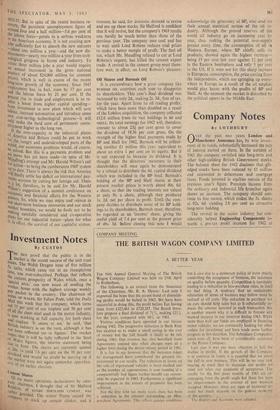Investment Notes
By CUSTOS
T. best proof that the public is in the market is the recent success of the unit trust issues. The Welsh Dragon issue of five million -)a. units, which came out at an inauspicious time, was over-subscribed. Perhaps that reflects the current, prosperity of Wales which, once a special area,' can now boast of sending the worker home with the highest average weekly pay packet in the country. The chairman of STEEL OF WALES, Sir Julian Pode, told the Daily Mail this week that his company, which turns °11.t 75 per cent of our tinplate and 50 per cent' 91' all the sheet steel used in the motor industry, Is now working at full capacity for both sheet and tinplate. 'It seems to me,' he said, 'that 14-itish industry is on the turn, although it has hopes been reflected yet in figures.' The market oPes that it will be fully reflected in the Steel 4:12.r Wales figures, the interim statement being ci ,ue in June. The shares are currently quoted dividend and would no doubt be moving up if " market were not again somewhat apprehen- sRe of an earlier election.
Content Shares
Of the many optimistic declarations by com- pany chairmen,
, of 1 thought that of Sir Halford Reddish, RUGBY PORI LAND CEMENT, was
guarded. The winter freeze caused the ‘:"°111PallY to stock up cement clinker, and it
remains, he said, for domestic demand to revive and use up these stocks. Sir Raiford is confident that it will revive, but the company's 1963 results can hardly be much better than those of the previous year. The company uses coal and has to wait until Lord Robens reduces coal prices to make a better margin of profit. The fuel oil tax, which Mr. Maudling refused to cut at Lord Robens's request, has killed the cement export trade. A revival in the cement group must there- fore wait, in effect, on Lord Robens's pleasure.
Oil Shares and Burmah Oil
It is extraordinary how a great company like BURMAH OIL contrives each year to disappoint its shareholders. This year's final dividend was increased by only 2d., making 2s. 3d., free of tax, for the year. Apart from its oil trading profits, which have been more than doubled as a result of the Lobitos acquisition, the company collected £12.6 million from its vast holdings in BP and SHELL. Its, total earnings for 1962 will, therefore, amount to about 231 per cent gross to cover the dividend of 18.36 per cent gross. On the strength of the higher final payments made by BP and Shell for 1962, Burmah will be collect- ing another £1 million this year, equivalent to about an extra 1 per cent on its equity. But it is not expected to increase its dividend. It is thought that the directors' meanness to their shareholders will once again be demonstrated by a refusal to distribute the 4d. capital dividend which was included in the BP final. Burmah's holding of the BP and Shell shares at their present market prices is worth about 40s. 6d. a share, so that the trading interests are valued at only 9s. a share, although they produced Is. 2d., net per share in, profit. Until the com- pany decides to distribute some of its BP hold- ings to its shareholders, Burmah must, therefore, be regarded as an 'income' share, giving the useful yield of 7.4 per cent at the present price of 49s. 3d. Before closing this note I would acknowledge the generosity of BP, who send me their annual statistical review of the oil in- dustry. Although the proved reserves of the world oil industry go on increasing year by year, thus making the potential over-supply greater every time, the consumption of oil in Western Europe, where BP chiefly sells its products, showed again the highest increase— being 15 per cent last year against 12 per cent in the Eastern hemisphere and only 5 per cent in the US. If it were not for this sharp increase in European consumption, the price-cutting from the independents, which are springing up every- where in Europe as a result of the oil surplus, would play havoc with the profits of BP and Shell. At the moment the market is disturbed by the political upsets in the Middle East.






































 Previous page
Previous page